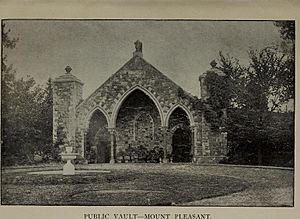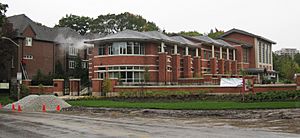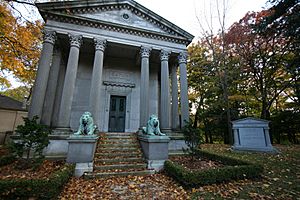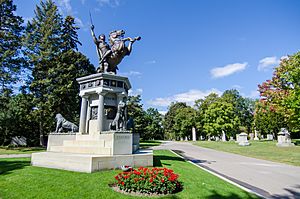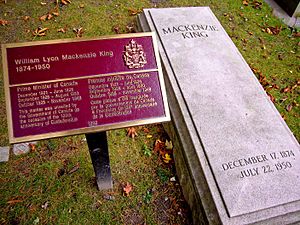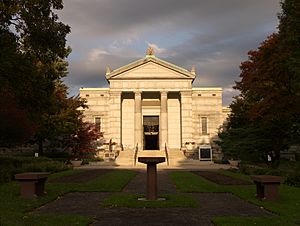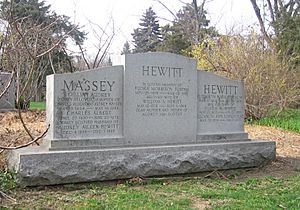Mount Pleasant Cemetery, Toronto facts for kids
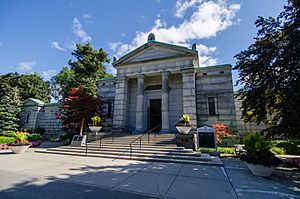
Mount Pleasant Cemetery's crematorium and mausoleum
|
|
| Details | |
|---|---|
| Established | November 4, 1876 |
| Location | |
Mount Pleasant Cemetery is a large and beautiful cemetery in Toronto, Ontario, Canada. It opened in November 1876 and is known for its lovely gardens, fountains, and unique trees. It was designed by a landscape architect named Henry Adolph Engelhardt, who was inspired by famous garden cemeteries in Europe and America.
More than 168,000 people have been laid to rest here. The cemetery also features amazing buildings and monuments. In 2000, Mount Pleasant Cemetery was named a National Historic Site of Canada, which means it's a very important place in Canadian history.
Contents
History of Mount Pleasant Cemetery
In the early 1800s, the town of York (which is now Toronto) only had cemeteries for members of the Catholic Church or the Church of England. This meant that people from other religions, like those of Jewish faith, had to find burial places far away.
To solve this problem, a group of people asked for a new "General Burying Ground" where anyone could be buried, no matter their religion. In 1826, a law was passed, and a piece of land known as "Potters Field" became a cemetery for everyone. Over time, more land was added to this area, which became the Toronto General Burying Ground.
In 1873, plans began for an even larger cemetery. This new cemetery was built on a big farm, far outside the city at the time. Mount Pleasant Cemetery officially opened on November 4, 1876. It had over 19 kilometers (about 12 miles) of paths for carriages and walking, winding through rolling hills and ponds. Later, Mount Pleasant Road was built right through the middle of the cemetery and was named after it. As Toronto grew, Mount Pleasant Cemetery ended up right in the heart of the city.
Many Canadian soldiers who died in the World Wars are buried here. The cemetery contains 231 graves cared for by the Commonwealth War Graves Commission. These include 126 burials from World War I and 105 from World War II. Most of these soldiers (188) were Canadian, and 43 were British.
In 2009, the cemetery opened the Mount Pleasant Visitation Centre. This large building is about 2,200 square meters (23,680 square feet). It was built to provide a space for visitations and chapel services.
Important Memorials
Mount Pleasant Cemetery has several memorials that remember important events and groups of people:
- SS Noronic Fire Memorial: This memorial remembers the 118 people who died in a fire on the cruise ship SS Noronic on September 17, 1949.
- RMS Empress of Ireland Memorial: This memorial honors the 167 members of the Salvation Army who died when the ship Empress of Ireland sank on May 29, 1914.
- Air Canada Flight 621 Memorial: This memorial was put up in May 1971 to remember the 109 lives lost in the crash of Air Canada Flight 621 on July 5, 1970. Many of the victims are buried around this memorial.
- Children's Garden Memorial: This special garden remembers stillborn babies and children without known parents who were buried in one area without individual markers.
- 48th Highlanders of Canada Memorial: This memorial honors two soldiers who died in a training exercise in 1912. It also serves as a monument to veterans and those who died in the Second Boer War from the 48th Highlanders of Canada regiment.
Notable People Buried Here
Many famous and important Canadians are buried at Mount Pleasant Cemetery. Here are some of them:
Business Leaders
- Alfred J. Billes (1902–1995): He helped start Canadian Tire, a very popular store in Canada.
- William Mellis Christie (1829–1900): He is the person behind the famous "Mr. Christie" brand of cookies and biscuits in Canada.
- Timothy Eaton (1834–1907): He founded Eaton's, a huge department store chain that was very important in Canadian history.
- Edward S. Rogers Sr. (1900–1939): He started Rogers Majestic, which was a big step in Canadian broadcasting.
- Robert Simpson (1834–1897): He founded Robert Simpson Limited, another major department store.
- Steve Stavro (1926–2006): He started the grocery store chain Knob Hill Farms and was also a former owner of the Toronto Maple Leafs hockey team.
- Kenneth Thomson, 2nd Baron Thomson of Fleet (1923–2006): He was a very successful businessman and, at one point, the richest person in Canada.
- George Weston (1864–1924): He founded George Weston Limited, a large food processing and distribution company.
Medical Pioneers
- Sir Frederick Banting (1891–1941) & Charles Best (1899–1978): These two scientists are famous for co-discovering insulin, a life-saving medicine for diabetes.
- Jennie Smillie Robertson (1878–1981): She was Canada's very first female surgeon.
Music Personalities
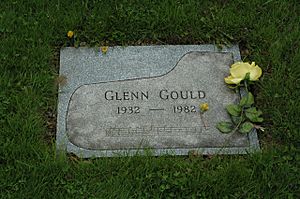
- Bobby Gimby (1918–1998): He wrote the popular song "Ca-na-da," which was the theme for Expo 67.
- Glenn Gould (1932–1982): He was a world-famous classical pianist, known for his unique style.
- Alexander Muir (1830–1906): He wrote "The Maple Leaf Forever," which was an early unofficial national anthem for Canada.
- John Rutsey (1953-2008): He was the original drummer for the famous progressive rock band Rush.
Politicians
- William Lyon Mackenzie King (1874–1950): He was the 10th Prime Minister of Canada and served for a very long time.
- Oliver Mowat (1820–1903): He was the 3rd Premier of Ontario and one of the "Fathers of Confederation," who helped create Canada.
- Egerton Ryerson (1803–1882): He was a minister and a key figure in developing public education in Upper Canada (now Ontario).
- John Turner (1929-2020): He was the 17th Prime Minister of Canada in 1984.
- William Dennison (1905-1981): He was the 55th Mayor of Toronto.
Sports Personalities
- Charlie Conacher (1909–1967): A Hall of Fame ice hockey player and coach in the NHL.
- George Seymour Lyon (1858–1938): He won a Gold Medal in golf at the 1904 Summer Olympics.
- Igor Korolev (1970–2011): A Russian-born hockey player who played in the NHL.
Titanic Survivors
- Arthur Godfrey Peuchen (1859–1929): A Canadian businessman and soldier who survived the sinking of the RMS Titanic.
- Ethel Flora Fortune (1883-1961): A first-class passenger who also survived the sinking of the RMS Titanic.
War Heroes
- William George 'Billy' Barker (1894–1930): A brave World War I flying ace who received the Victoria Cross, the highest military award.
- George Fraser Kerr (1895–1929): Another World War I soldier who received the Victoria Cross.
Other Notable People
- Northrop Frye (1912–1991): A very important educator and literary critic.
- Edward Greenspan (1944–2014): A famous defense lawyer in Canada.
- Foster Hewitt (1902–1985): A legendary Canadian radio and television broadcaster, especially known for hockey.
- Robert Sutherland (c.1830-1878): Canada's first Black lawyer and a generous supporter of Queen's University.
- Peter Worthington (1927–2013): A well-known Canadian journalist.
Images for kids
 | Claudette Colvin |
 | Myrlie Evers-Williams |
 | Alberta Odell Jones |


